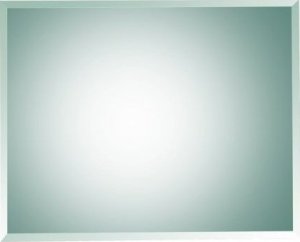Mirrors (Figure 1) are not only decorative but in some rooms such as a bathroom they are functional as well. No one wants to replace mirrors on a regular basis. To ensure that your mirror will last we are providing information on how to choose a quality mirror.

Figure 1 - Frameless wall mirror
Overall Mirror Quality:
The quality of a mirror is governed by four aspects:
- The purity of the sheet of glass
- The accuracy of the plain or flatness of the sheet of glass
- The thickness of the mirror's glass
- The reflective coating on the glass, which turns a sheet of glass into a mirror.
Glass Quality:
The quality of the glass is relative to the manufacturing process and the level of purity of the raw materials used. The best glass will have no inconsistencies in its makeup and hence it will not distort a reflection.
Mirror Thickness:
Although the quality of the glass is important, the overall mirror quality can generally be represented by the thickness of the mirror. Mirrors, for home applications, are available in 1/8, 3/16 and 1/4 inch thicknesses.
If your budget can handle the extra cost, you should always choose a mirror that is a 1/4 inch thick. A 1/4 inch thick mirror will generally not distort the reflection, even if the wall that it is mounted on, is not truly flat. Glass is flexible and because of this, as adhesive dries, it will mold the mirror to any wall inconsistencies, this creates a distortion in the reflection.
Mirror Silvering:
A mirror is a piece of glass that has a coating applied to one side. It is this coating that produces the reflection, not the glass.
There are numerous coating materials, the most common being a mixture of silver nitrate with other chemical compounds, which is then applied to the glass. This surface is then covered with red lead, which provides a mechanical protection for the silver nitrate. A final coating of sealer is then applied over the red lead. Figure 2 shows the construction makeup of a mirror.

Figure 2 - Composition of a mirror (not to scale)
From a homeowners' point of view inexpensive mirrors will use lower quality and very thin coatings of reflective material compared to more expensive mirrors.
To obtain a high quality mirror, it is best to discuss your application and what you expect from the mirror in terms of reflection quality and life expectancy with a specialty glass and mirror retailer. Your local big box store, is generally selling low quality, inexpensive, mirrors.
